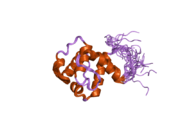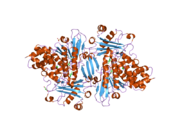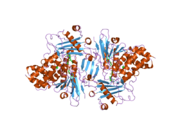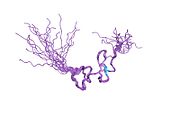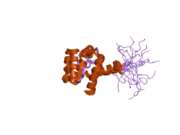MICAL1
Appearance
NEDD9-interacting protein with calponin homology and LIM domains is a protein that in humans is encoded by the MICAL1 gene.[4][5]
Interactions
[edit]MICAL1 has been shown to interact with NEDD9[4] and RAB1A.[6]
References
[edit]- ^ a b c GRCm38: Ensembl release 89: ENSMUSG00000019823 – Ensembl, May 2017
- ^ "Human PubMed Reference:". National Center for Biotechnology Information, U.S. National Library of Medicine.
- ^ "Mouse PubMed Reference:". National Center for Biotechnology Information, U.S. National Library of Medicine.
- ^ a b Suzuki T, Nakamoto T, Ogawa S, Seo S, Matsumura T, Tachibana K, Morimoto C, Hirai H (Apr 2002). "MICAL, a novel CasL interacting molecule, associates with vimentin". J Biol Chem. 277 (17): 14933–41. doi:10.1074/jbc.M111842200. PMID 11827972.
- ^ "Entrez Gene: MICAL1 microtubule associated monoxygenase, calponin and LIM domain containing 1".
- ^ Weide, Thomas; Teuber Julia; Bayer Michael; Barnekow Angelika (Jun 2003). "MICAL-1 isoforms, novel rab1 interacting proteins". Biochem. Biophys. Res. Commun. 306 (1). United States: 79–86. doi:10.1016/S0006-291X(03)00918-5. ISSN 0006-291X. PMID 12788069.
Further reading
[edit]- Iwata S, Ohashi Y, Kamiguchi K, Morimoto C (2000). "Beta 1-integrin-mediated cell signaling in T lymphocytes". J. Dermatol. Sci. 23 (2): 75–86. doi:10.1016/S0923-1811(99)00096-1. PMID 10808124.
- Maruyama K, Sugano S (1994). "Oligo-capping: a simple method to replace the cap structure of eukaryotic mRNAs with oligoribonucleotides". Gene. 138 (1–2): 171–4. doi:10.1016/0378-1119(94)90802-8. PMID 8125298.
- Suzuki Y, Yoshitomo-Nakagawa K, Maruyama K, et al. (1997). "Construction and characterization of a full length-enriched and a 5'-end-enriched cDNA library". Gene. 200 (1–2): 149–56. doi:10.1016/S0378-1119(97)00411-3. PMID 9373149.
- Hattori A, Okumura K, Nagase T, et al. (2001). "Characterization of long cDNA clones from human adult spleen". DNA Res. 7 (6): 357–66. doi:10.1093/dnares/7.6.357. PMID 11214971.
- Terman JR, Mao T, Pasterkamp RJ, et al. (2002). "MICALs, a family of conserved flavoprotein oxidoreductases, function in plexin-mediated axonal repulsion". Cell. 109 (7): 887–900. doi:10.1016/S0092-8674(02)00794-8. PMID 12110185.
- Strausberg RL, Feingold EA, Grouse LH, et al. (2003). "Generation and initial analysis of more than 15,000 full-length human and mouse cDNA sequences". Proc. Natl. Acad. Sci. U.S.A. 99 (26): 16899–903. Bibcode:2002PNAS...9916899M. doi:10.1073/pnas.242603899. PMC 139241. PMID 12477932.
- Weide T, Teuber J, Bayer M, Barnekow A (2003). "MICAL-1 isoforms, novel rab1 interacting proteins". Biochem. Biophys. Res. Commun. 306 (1): 79–86. doi:10.1016/S0006-291X(03)00918-5. PMID 12788069.
- Mungall AJ, Palmer SA, Sims SK, et al. (2003). "The DNA sequence and analysis of human chromosome 6". Nature. 425 (6960): 805–11. Bibcode:2003Natur.425..805M. doi:10.1038/nature02055. PMID 14574404.
- Ota T, Suzuki Y, Nishikawa T, et al. (2004). "Complete sequencing and characterization of 21,243 full-length human cDNAs". Nat. Genet. 36 (1): 40–5. doi:10.1038/ng1285. PMID 14702039.
- Gerhard DS, Wagner L, Feingold EA, et al. (2004). "The status, quality, and expansion of the NIH full-length cDNA project: the Mammalian Gene Collection (MGC)". Genome Res. 14 (10B): 2121–7. doi:10.1101/gr.2596504. PMC 528928. PMID 15489334.
- Fischer J, Weide T, Barnekow A (2005). "The MICAL proteins and rab1: a possible link to the cytoskeleton?". Biochem. Biophys. Res. Commun. 328 (2): 415–23. doi:10.1016/j.bbrc.2004.12.182. PMID 15694364.
- Bayer M, Fischer J, Kremerskothen J, et al. (2006). "Identification and characterization of Iporin as a novel interaction partner for rab1". BMC Cell Biol. 6 (1): 15. doi:10.1186/1471-2121-6-15. PMC 1079803. PMID 15796781.
- Olsen JV, Blagoev B, Gnad F, et al. (2006). "Global, in vivo, and site-specific phosphorylation dynamics in signaling networks". Cell. 127 (3): 635–48. doi:10.1016/j.cell.2006.09.026. PMID 17081983. S2CID 7827573.
- Jin X, Zhang J, Dai H, et al. (2007). "Investigation of the four cooperative unfolding units existing in the MICAL-1 CH domain". Biophys. Chem. 129 (2–3): 269–78. doi:10.1016/j.bpc.2007.06.008. PMID 17662518.





